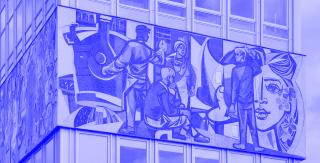
Subject Area
The Social Dimensions of Intercultural Relationships
Research into the field of international cultural transfer has revealed the reciprocal impact of intercultural encounters and the degree to which these contribute to the transformation of individual nations and societies. Examining interculturality in Eastern Europe means expanding one’s focus to processes of transnational entanglement.
Drawing on research into the art, urban, economic and social history of a long period stretching from the 16th century to the present, this subject area covers a broad spectrum of topics. These include questions about the sociocultural particularities of an Early Modern urban community or the infrastructure of post-socialist artistic production; questions about the cultures of economic activity in the region under »the global condition« since the late 19th century; questions about the cultural significance of work in the state-socialist industrial society as compared to the capitalist welfare state; or economic factors impacting the constructions of images of the self and the other around 1900. The research topics are characterised by their methodological diversity and critical interrogation of long-established conceptions of centre and periphery, model and reception, progress and backwardness, while they also challenge essentialist constructions of identity.
Research Subjects
Constructive Relativities
Eastern Europe, historically framed through Western lenses as a byproduct of Enlightenment or Cold War narratives, has seen limited exploration from Eastern perspectives. The scarcity of viewpoints from the East creates a historiographic asymmetry, which is to be reduced by this research which delves into Armenian perspectives on Eastern Europe, unveiling how it was defined in pre-modern and early-modern sources.
Far-right Digital Activism
The project analyses right-wing extremist memory activism in Southeast Europe and its transnational connections that extend beyond the region.
Food in the history of Siberia
Since the very first Russian and European encounters with Siberia, Siberian Indigenous food has been the subject of cultural curiosity, physical contact, intellectual interpretations, and colonial influence. The project explores the role that food played in the process of colonization and exploration of Siberia in the 17th and 18th centuries and the ways in which food impacted the relationships between Indigenous peoples and newcomers.
Institutions and Cultures of Economic Activity
This section examines the transfer of economic institutions into Eastern Europe and their adaptation to regional parameters, value judgments and patterns of behaviour. It is searching for answers to what role processes of entanglement and globalisation played in the formation and development of regionally specific cultures of economic activity.
Popular Entertainment in Multiethnic Cities

The project examines public spheres in multiethnic cities around 1900 through the lens of popular entertainment and thereby scrutinises. Urban spatial orders and conflict narratives anchored in historiography.
Premodern Migratory Society

Based on the example of an early modern urban society in Eastern Europe, this project examines the socio-cultural consequences of long-term and multifaceted processes of migration. The aim is to trace and explain the specific features that shaped multi-ethnic and multi-confessional urban coexistence beyond national antagonisms.
Sponsoring the Arts in Post-Socialism
The research provides a critical analysis of the motives driving some transnationally active funding bodies to ensure the continued production and the global distribution of contemporary art from East-Central Europe.
Traveling Seminars »Linking (Art) Worlds«
The art scenes of the postwar United States and Eastern Europe have been rarely viewed within a shared framework. Rather, art history writing has captured the post-war decades in terms of an ultimate difference between artistic styles and cultural politics in the two opposing political blocs.

